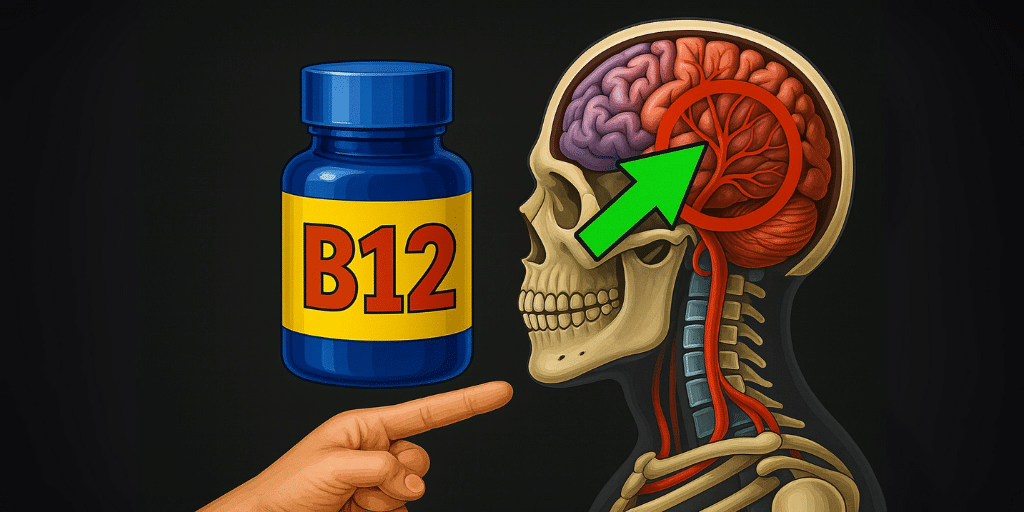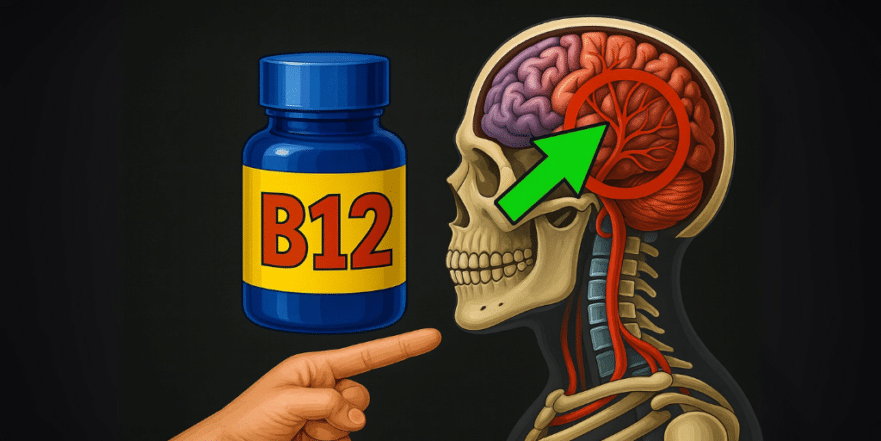
Did you know that a lack of vitamin B12 can cause serious, irreversible damage to your nervous system? It’s pretty wild to think about, especially since you might not even notice symptoms for years. That’s because your body stores B12 in the liver, and those stores can last for three to six years. So, you could be gradually becoming deficient without realizing it.
So, what exactly is vitamin B12, and why is it so important? Well, it’s absolutely essential for our bodies to function properly, playing a role in all sorts of chemical reactions. The kicker? Our bodies can’t make it on their own, which means we have to get it from outside sources.
The Four Pillars of Vitamin B12’s Importance
Vitamin B12 is a big deal for a few key reasons:
- Red Blood Cell Formation: It’s super important for making red blood cells. These guys are like the delivery trucks of your body, carrying oxygen to all your cells and tissues. Without enough B12, you can’t make enough red blood cells, which means less oxygen, and that can lead to feeling tired and weak.
- Nervous System Health: This is a huge one. B12 helps create myelin, which is like the insulation around your nerves. This insulation allows nerve signals to travel smoothly and quickly. It also helps make neurotransmitters like serotonin and dopamine, which are pretty famous for their roles in mood and well-being.
- DNA Synthesis: Vitamin B12 is necessary for creating DNA, the genetic material that’s in all your cells. Proper DNA creation is vital for cells to work correctly.
- Protein Metabolism: It’s also needed for processing proteins, which are the building blocks for pretty much everything in your body – organs, tissues, you name it. B12 helps keep them structured and functioning right.
Recognizing the Signs of B12 Deficiency

When you don’t have enough B12, you can end up with a couple of main issues: anemia and neurological problems. Sometimes these happen together, but they can also occur separately.
It’s important to be aware that in more serious cases, especially for older adults, the neurological symptoms can become permanent. So, it’s definitely something to pay attention to.
Symptoms of Anemia Due to B12 Deficiency
If your body isn’t making enough red blood cells, you might start to feel:
- Tired and weak
- Pale skin
- Heart palpitations or a faster-than-usual heartbeat
- Abdominal discomfort
- Loss of appetite and weight loss
- Dizziness or shortness of breath in more severe cases
Sometimes, you might also notice a sore, red tongue, or a burning sensation in your mouth. This can be a sign of a specific type of anemia called pernicious anemia, which is often linked to an autoimmune condition affecting the stomach.
Neurological Symptoms of B12 Deficiency

Problems with the nervous system usually stem from issues with that myelin insulation we talked about. If it’s not formed correctly, nerve signals can get disrupted. This can lead to:
- Tingling or numbness, often starting in the hands and feet
- Decreased sensitivity to touch or vibration
- Difficulty with balance and walking
- Muscle weakness
- Changes in personality, like irritability
- Symptoms of depression
- In more advanced stages, confusion or even dementia, particularly in older individuals
It’s crucial to remember that neurological symptoms can appear even if you don’t have anemia. And if they get bad enough, they might not be reversible, especially in older people.
What Causes Low Vitamin B12?
There are three main reasons why you might not have enough B12:
- Not Enough Intake: You’re simply not eating enough foods that contain B12.
- Poor Absorption: You’re eating B12-rich foods, but your digestive system isn’t absorbing it properly.
- Ineffective Use: Your body isn’t using the B12 it absorbs as it should.
Low Intake
This is most common in strict vegetarians or vegans who don’t get B12 from animal products. It can also happen if someone has very unusual or restrictive eating habits for psychological reasons. Of course, general malnutrition in areas with food scarcity can also lead to B12 deficiency.
Poor Absorption

Problems with absorption can happen for several reasons:
- Digestive System Diseases: Conditions like atrophic gastritis (which we mentioned earlier, often seen in younger people with pernicious anemia) or other intestinal issues like Crohn’s disease or celiac disease can affect B12 absorption.
- Surgery: If you’ve had surgery that removes part of your stomach or intestines, like gastric bypass surgery for obesity, your ability to absorb B12 can be significantly reduced.
- Stomach or Intestinal Issues: Having your stomach or part of your intestine removed due to cancer or other diseases can also impact B12 absorption.
- Medications: Certain medications can interfere with B12 absorption over time. These include proton pump inhibitors (like omeprazole) used for acid reflux, metformin (a common diabetes medication), and colchicine (used for gout).
Ineffective Use
Sometimes, even if you’re getting and absorbing enough B12, your body might not be using it correctly. This can be due to problems with the enzymes that process B12, issues with the proteins that transport B12 in your blood, or liver problems that affect how B12 is handled, since the liver stores a good amount of it.
How Do You Know If You’re Deficient?
The only real way to know for sure is to suspect it based on symptoms and medical history, and then get tested. Your doctor will likely ask about your symptoms, do a physical exam, and order blood tests. Standard blood work might show anemia with larger-than-normal red blood cells, but sometimes anemia isn’t present even with low B12. If B12 deficiency is suspected, further tests might be done, especially if you have a history of conditions like atrophic gastritis, intestinal problems, relevant surgeries, or follow a strict vegan diet.
Getting Your Vitamin B12

Naturally, vitamin B12 is found in foods like:
- Meat
- Fish
- Shellfish
- Eggs
- Milk and dairy products
The recommended daily intake is generally around 2.4 micrograms (mcg), with slightly higher amounts for pregnant or breastfeeding women and slightly less for children. It’s always good to check specific recommendations based on age and weight.
For vegetarians and vegans, it’s important to look for fortified foods. This can include plant-based milks (like soy or almond milk), breakfast cereals, or nutritional yeast that have B12 added. Some algae, like chlorella, are also mentioned, but the evidence is strongest for fortified foods and supplements.
If you’re vegan or vegetarian and have concerns, talking to a registered dietitian or nutritionist is a great idea. They can help you plan your diet and advise on supplements if needed.
Treating B12 Deficiency
Treatment depends on how low your B12 levels are and the reason for the deficiency.
- Mild Deficiency or No Symptoms: For mild cases, or if you’re vegetarian/vegan, older, or have certain types of anemia, oral supplements are often prescribed. These might be combined with folic acid or other vitamins and minerals.
- Absorption Issues or Severe Symptoms: If you have significant absorption problems (due to surgery or digestive diseases) or if you’re experiencing neurological symptoms, injections are usually necessary. Treatment might start with daily injections, then weekly, and then monthly injections indefinitely, unless the underlying cause is fixed. While injections can reverse symptoms, severe neurological damage, especially in older adults, might be permanent.
Source: Dr. Alberto Sanagustín

